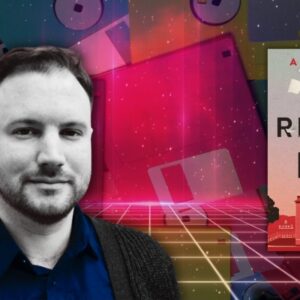When I decided to write a novel, Elizabeth Holmes took up residence inside my head almost immediately. She lurked in my imagination as I created my anti-heroine. I could almost hear her whisper in that haunting, deep voice as I wrote. It was as if she was pacing along the margins, signature black turtleneck on, green juice in hand, making sure I got it right. With every line of dialogue, every detail of my main character’s tech startup, I had the Theranos founder in mind.
Just not in the way you think.
Elizabeth Holmes was not the blueprint for my fierce, complicated CEO protagonist, Caroline Archer. Neither was Theranos the basis for Equilibrium, the feminist tech startup Caroline leads. Caroline emerged not from the felonious founder herself, but rather from the legacy she left behind — a legacy that is weaponized against female entrepreneurs to this day.
At the beginning of Our Secrets Were Safe, Caroline finds herself, “…sick of hearing how much I look like Elizabeth Holmes. The comparison usually came from male executives who accepted the Theranos scandal as definitive proof that female executives are not to be trusted.”
This isn’t fictional hyperbole. Ten years after fraud allegations first swirled around Elizabeth Holmes, female-founded companies fare far worse in venture capital funding than their male-founded and mixed-founded peers. In 2023, female founders received just 2% of total US VC investment. Holmes resurfaced in the public eye in May of that year with her official prison sentencing, an event that capped off a media frenzy that spawned everything from a New York Times best-selling book to an Emmy-winning limited series.
Coincidence? Industry insiders think not. Enter the “Holmes Effect”: the sexist belief that the misdeeds of one female CEO justify bias against all women entrepreneurs. In February, Inc. Magazine highlighted numerous female executives’ experiences with this phenomenon, and reality is stranger than fiction.
And things just recently got worse: female-founded companies received just 1% of VC founding in 2024, despite new research that suggests women-run companies perform better than companies run by men. The “Holmes Effect”, plus the recent war on DEI initiatives, has exposed more than one persistent sexist double standard in our culture.
It’s jarring, for instance, to even imagine a world in which we speak about men the way we do about women at work. Ever heard of the “Bernie Madoff Effect”? Read about the flaws of the “boy boss” movement? Or scrolled past Instagram accounts documenting a “working dad’s” pursuit of “having it all”?
No?
Of course not. Linguistic misogyny is as ingrained in the working world as popcorn ceilings and bad lighting. These charged words have power, and they double as self-fulfilling prophecies. They shape not just cultural attitudes but major investment decisions, representation in boardrooms, the salary inked on paychecks, and this country’s shocking lack of family leave policies.
And while most of us don’t struggle with borderline sociopathy and a complete inability to match lipstick to our skin tones, we do struggle against misogyny so insidious that it affects everyday language. This fact led me down quite the research rabbit hole that led to a core element of Our Secrets Were Safe.
According to 2024 research, women are more likely to apply for jobs for which they meet 100% of listed qualifications; whereas 60% is good enough for men. This isn’t a confidence issue. Women know from experience that they must surpass the requirements in order to be recognized for merely meeting them. Once we get the job, women are more likely to be described as “compassionate” rather than “competent”, more often perceived as “helping” versus “taking charge”. Exceptional terms like “brilliance” or “genius” are also generally reserved for men — they even favor boys over girls.
Experiences from my own life also came to mind as I imagined a tech company that would combat this persistent linguistic “ick”. In my teacher training, I was told to lower the pitch of my voice — if I didn’t, how could I be surprised if my students didn’t want to listen to me speak? During a parent-teacher conference, a grown man asked his twelve-year-old stepson isn’t it nice to have your own personal secretary? He was talking about me.
Then came my stint at a tech company. I thought about the supervisor who called me a “smart cookie” (to my knowledge, men don’t have their intelligence measured in baked goods). I thought about the employees I oversaw who heard identical feedback from a male colleague and from me. His earned respect. Mine “micromanaged”. I thought about conversations with friends as we compared notes across our respective fields. Mediocre male coworkers got that promotion. The wrong paycheck was opened to reveal what we’d read about in the news.
All these ideas and experiences boiled down to one fundamental question: at what point are women allowed to simply exist in the world, unburdened by the double-standards that follow us around like the nonstop marketing of anti-aging products? The answer was obvious: we’re not.
So, what happens when exceptionally bright, ambitious women confront this fact, business plan in hand? They land somewhere between a glass ceiling and a hard place. It’s treacherous territory. How far will some go to escape it? How far will they go if pushed?
I built a novel around these questions. My CEO protagonist became someone who has to fight against the “Holmes Effect” and more. Her brainchild, Equilibrium, became feminist AI software.
Like so many of us, the fictional Caroline Archer had to work twice as hard to get half as much. Unrelenting double-standards take a brutal toll on women. Fighting against inequality requires more than a thick skin. And once you tell yourself you’ll do anything to accomplish your goal, and the world shows you that’s exactly what it will take, when do the lines blur between determined and dangerous?
When you’ve built something with your entire being, sacrificed parts of yourself that you can never get back, what wouldn’t you do to protect what you created? Caroline goes there, and for me, that journey reflected more than one dark truth about what women are up against today.
In that sense, writing this book was cathartic in ways I never expected. And that’s the beauty of storytelling. Words create the world in which we live. To make a better one for women, we have to keep using them — using them well, and using them loudly.
***


















